Key Takeaways:
- Mars unveils first-ever structured plan to protect peanut crop from pests, disease, and climate change
- $5 million pledged over five years to fund next-gen agri-science and genetic research
- Builds on $10 million in previous investments, including mapping the peanut genome
- Collaboration with institutions in the U.S. and Brazil already yielding high-performing, resilient varieties
- Initiative supports Mars’ broader Sustainable in a Generation strategy
Mars Announces Multi-Year Effort to Reinforce Peanut Resilience
Mars, Incorporated unveiled the Mars Protect the Peanut Plan, a long-term initiative designed to address growing threats to global peanut production. The plan commits $5 million over five years toward advancing agricultural science aimed at developing peanut varieties that can withstand rising pressures from climate change, pests, and disease.
Mars’ investment doubles down on over a decade of peanut-focused research, including its leadership role in the Peanut Genome Initiative, which successfully mapped more than 2.5 billion base pairs of the peanut’s DNA. This publicly available genomic data has opened the door to precision-driven agricultural innovation.
From Innovation to Implementation
Amanda Davies, Chief R&D, Procurement and Sustainability Officer at Mars Snacking, emphasized the company's commitment to science-backed agriculture: “We know that the perfect peanut won't be discovered by accident. It will take long-term investment, scientific ingenuity, and the dedication of our incredible partners to keep turning potential into progress.”
This progress is already materializing. Mars’ work with the University of Georgia’s Wild Peanut Lab has led to development of hardier peanut varieties, such as Sempre Verde, now grown in Brazil without the use of fungicides, while boosting yields by up to 30%.
Global Partnerships Driving Genetic Progress
The Protect the Peanut Plan includes collaboration with leading research institutions such as:
- University of Georgia Tifton Campus, HudsonAlpha Institute for Biotechnology, and USDA ARS to develop drought- and disease-resistant strains
- Instituto Agronômico de Campinas (IAC) and EMBRAPA in Brazil to breed resilient peanuts using wild species
- Ongoing partnerships with INTA and other global agriculture experts to ensure scientific breakthroughs are implemented at scale
Dr. Soraya Bertioli of the University of Georgia noted: “Creating more resilient peanuts requires transformative science, discipline and partnership. Our breakthroughs would not be possible without the long-term support of Mars.”
A Sustainable Future for Peanut Farming
The Protect the Peanut Plan is a critical piece of Mars’ Sustainable in a Generation initiative, which seeks to address food security, farmer livelihoods, and climate resilience across its supply chains. With peanuts serving as a key protein source for millions globally, the company sees safeguarding the crop as a moral and business imperative.
Mars’ efforts aim to ensure that the peanut continues to thrive not just as a snack ingredient, but as a sustainable, nutritious, and accessible food source for generations to come



1 Comment